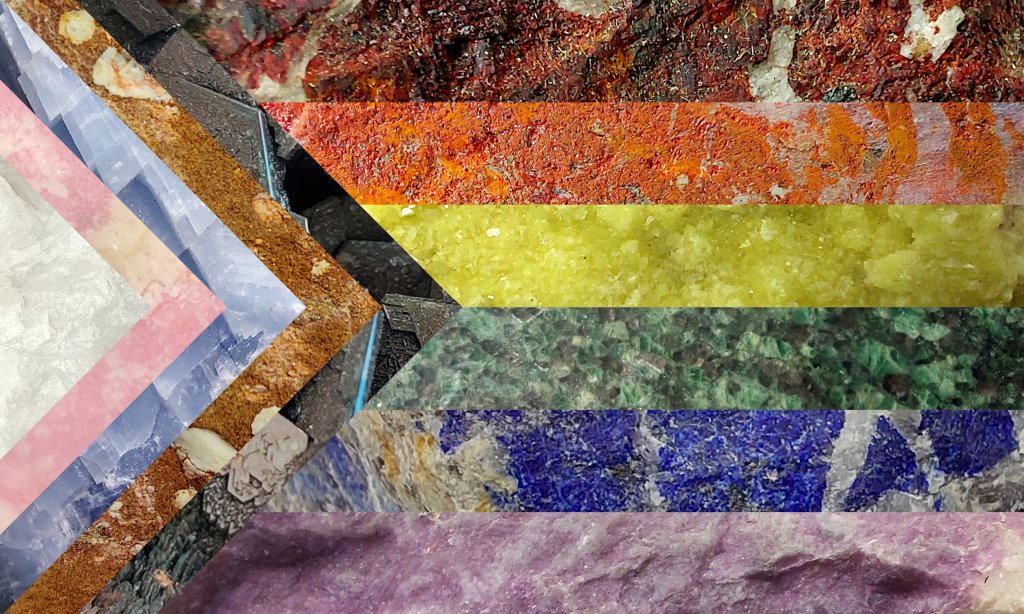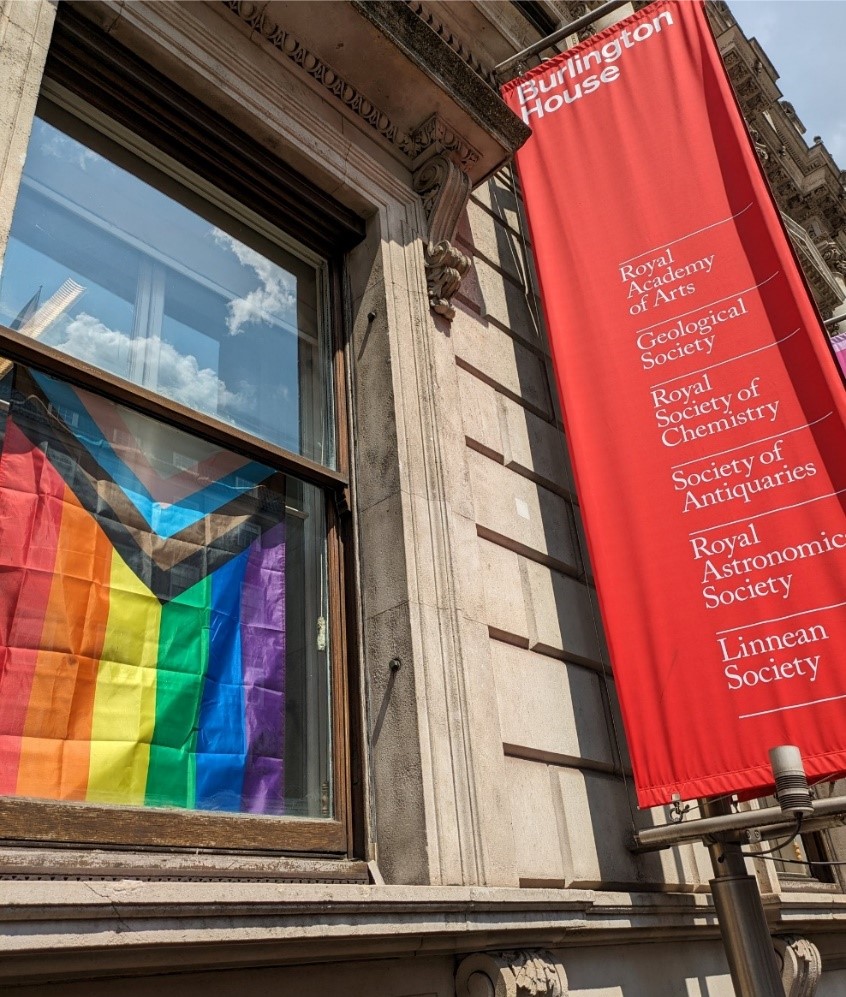Written by Gemma Laker, Palaeontology and Geobiology MScR Student at the University of Edinburgh and GCG EDI Coordinator.
There has come to be an increasing understanding and awareness that science is better done by diverse groups of scientists, each contributing their unique experiences and perspectives to the scientific community (Mogk, 2020). However, Geoscience remains the least diverse of all STEM disciplines (Bernard and Cooperdock, 2018). This is alarming, with monumental and complex challenges like climate change and resource depletion being geoscientists’ responsibility to tackle, therefore necessitating increased inclusivity and openness. As June marks the beginning of Pride Month, awareness of the difficulties and challenges of those identifying as LGBTQ+ in Geoscience is required, as well as a celebration of progress and initiatives being created.
The GCG stands with all LGBTQ+ individuals and always aims to be the most inclusive and safe space that we possibly can be. The consideration of diversity within the group and collections has been prioritised over the last few years within our Code of Conduct, Diversity and Inclusion Working Group, and the EDI Coordinator committee role. We aim to hold more EDI-related events, develop new ideas, push external initiatives, and always want to hear from you! Please contact edi@geocurator.org if you have any questions, recommendations, or ideas.
Please note that this article contains conversation surrounding homophobia, which may be distressing or triggering for some readers.
This article uses the acronym LGBTQ+ which stands for Lesbian, Gay, Bisexual, Transgender, and Queer, with the + representing and encompassing other identities. Whilst the word queer has had a troublesome origin, in recent years it has been increasingly reclaimed and acknowledged in LGBTQ+ as well as mainstream spaces and is therefore used in this article to recognise and celebrate this change.

Understanding the Challenges:
Discussing EDI issues in and outside of the workplace can sometimes be underappreciated and met with resistance, however, LGBTQ+ geoscientists face challenges and unique experiences that calls for recognition and wider understanding at all levels.
Before aspiring geoscientists even enter education they may be discouraged from the subject due to the perception of Geology being traditional, white, and masculine (Rogers, et al., 2024). This feeling of disconnect stems from false portrayals of geoscientists, and leads to a continuation of the rhetoric that open conversations about diversity and oppression aren’t welcome in STEM disciplines.
This continues into university, where despite a recent survey revealing 37% of UK STEM students identify as LGBTQ+ (Cibyl, 2019), a lack of representation and support from staff and institutions to understand and uplift these students exists. Inquiring nearly 300 LGBTQ+ Geoscience graduates, Olcott and Downen (2020) found that over 90% believed that increased visibility in their education would have benefitted their experience. Transitioning from university into work, Stonewall (2018) showed that 62% of UK university graduates go back into the closet, a figure likely higher in Geoscience, again reiterating the sometimes hostile environments in the discipline.
So what’s going down in the workplace? Unwelcoming atmospheres and erased identities have been presented above as a key issue, however subtle (but nonetheless impactful) comments and actions, known as microaggressions, can further isolate and ‘other’ LGBTQ+ geoscientists. Whilst a perception remains that explicit homophobia doesn’t significantly exist in the UK anymore, obvious and targeted actions still occur- ultimately leading to a loss of talent in Geoscience, with a third of LGBTQ+ scientists having considered leaving the physical sciences (Gibney, 2019).
Even if they remain in the sector, decreased retention and engagement of LGBTQ+ geoscientists exists, with many individuals intentionally opting out of potentially career-benefitting professional opportunities (Marin-Spiotta, et al., 2023), particularly fieldwork. Fieldwork is central to Geoscience research, from mapping, exploration, cruises, lab work, and conferences, living in a globalised world means these activities can occur anywhere. However, many destinations are unsafe to present or identify as LGBTQ+, as seen in the map below.
Additionally, just because somewhere has legalised homosexual activity, this does not mean that the country is safe to exist in, due to regional variation in attitudes towards LGBTQ+ individuals, especially in more rural areas where a majority of fieldwork occurs. This is especially worrying for LGBTQ+ Geoscience students who, due to power imbalances and lack of control of field locations, are significantly less likely than their professors to opt out of fieldwork due to concerns about their safety based on sexual identity (29% and 57% respectively) (Olcott and Downen, 2020). Therefore conducting research into the environments groups enter is integral, as well as ensuring LGBTQ+ geoscientists feel welcome in traditionally more corporate and masculine settings.
Quantifying the Issue:
A challenge in understanding the needs and issues faced by LGBTQ+ geoscientists is that there is a relative lack of data compared to other disciplines and marginalised groups (such as gender and race). Diversity initiatives depend on information to best support a group, however, LGBTQ+ experiences are often understudied. Reasons for this include being LGBTQ+ is not a visible characteristic, many individuals may deliberately choose to remain closeted, and identities and labels are not always clear-cut. In creating academic and industry spaces where people are comfortable not only disclosing, but celebrating their identity therefore leads to voices and opinions being shared on the best ways to elevate, include, and retain LGBTQ+ individuals.
It is also critical to understand multiple identities, as although there is some study on LGBTQ+ geoscientists, these do not adequately speak to the experiences of LGBTQ+ BAME (Black, Asian, and minority ethnic) geoscientists, who are severely underrepresented in the discipline, and therefore the datasets. Likewise, with growing anti-trans legislation and rhetoric being prominent in the UK, strong allyship for everyone is as important as ever. In adopting an intersectional approach, it can be understood that initiatives that work for some marginalised individuals may not work for others, so listening to the needs and experiences on an individual basis is also essential.
Looking Forward:
So what can you do to promote the aforementioned needed inclusivity and equity for LGBTQ+ geoscientists, both inside and outside of the office? On an individual level, conversation should be normalised and unacceptable behaviour challenged, as well as a greater understanding of key terminology and experiences, via completing and fully engaging with EDI training that is often offered in many workplaces. Signalling pronouns is one of the simplest ways of encouraging inclusivity; inserting these on email footers or event name badges shows others how you wish to be addressed, and normalises doing so for transgender, non-binary, and gender non-conforming individuals. There is often a burden of responsibility on the affected group to advocate for themselves and educate others, however, with many free and useful resources available good allyship has never been more accessible.
Visibility and storytelling is important and useful, but true inclusivity comes from robust, resilient, and diverse Geoscience communities. Community and openness in spaces that historically haven’t existed can be created on department levels via private online groups, social media support, open panels, and groups. LGBTQ+ role models and mentorship have shown to be extremely productive and helpful for both students and early-career geoscientists, and wider networks create connections of shared experiences and identities. On wider, institutional scales LGBTQ+ specific funding and awards can be granted, and conversely banning travel grants to places that persecute LGBTQ+ individuals could be considered.
Existing Initiatives:
Some existing initiatives and groups that aim to support and promote LGBTQ+ geoscientists can be found at the end of this article. Many of these include storytelling, networking, and advocacy and are useful tools for LGBTQ+ geoscientists to engage with, as well as allies to support. It should be noted that many of the existing initiatives mentioned are not UK-based, however, they form a blueprint and framework of what is possible. The UK Geoscience community is rather behind on their open support of LGBTQ+ issues, for example, 2023 was the first time in over 200 years that Burlington House (home of the UK Geological Society) hung a Pride flag up in Pride month (Stephen, 2023).

Conversation and action outside of Pride month is equally as important, and initiatives are beginning to form in the UK. The Geological Society put out a survey to LGBTQ+ geoscientists in 2023 to examine their experiences and needs, with dozens of responses showing the demand for space and action. From this, a closed discussion group was formed to plan strategies and ideas for promoting LGBTQ+ voices and careers, which is in development and is an exciting beginning of LGBTQ+ Geoscience promotion and celebration in the UK.
Ultimately, it is imperative to understand the role the majority must play in fighting injustice and how working together to promote equality for all is the way forward. For LGBTQ+ individuals coming out isn’t a single event, it’s a continuous process throughout one’s life that can be complex and met with resistance, particularly in traditional settings like the Geosciences, as presented in this piece. However, in ensuring as many voices as possible are heard, productive and actionable change can be brought about to ensure an inclusive and positive future for all.
Further Reading:
A conversation on building safe spaces for the LGBTQ+ community in the geosciences. Nature Communications, 12(1). https://doi.org/10.1038/s41467-021-24020-z
The Geological Society, LGBTQ+ Diversity Resources. https://www.geolsoc.org.uk/About/Diversity/resources/LGBTQ
STEM LGBT Initiatives and Figures:
500 Queer Scientists, https://500queerscientists.com/ and for Geologists, https://500queerscientists.com/geology/
Antarctic Glaciers, People in Antarctica, Alexander von Humboldt, https://www.antarcticglaciers.org/antarctica-2/people-in-antarctica/alexander-von-humboldt/
AusIMM, Council for Diversity and Inclusion, https://www.ausimm.com/advocacy/advocacy-committees-and-councils/council-for-diversity-and-inclusion/
Campus Pride, https://www.campuspride.org/
Consortium, Building Equality, https://www.consortium.lgbt/member-directory/building-equality/
InterEngineering LGBTQ+, https://interengineeringlgbt.com/
NoGLSTP, https://noglstp.org/
OutinSTEM, https://www.ostem.org/
Pride Professionals, Specialised LGBTQ+ Mentoring Programs, https://prideprofessionals.com.au/
Science Museum of Virigina, LGBTQ+ Scientists, https://smv.org/learn/blog/pride-paleontology-highlighting-lgbtq-scientists/ and https://smv.org/learn/blog/pride-paleontology-highlighting-more-lgbtq-scientists/
Wilde, A. (2023). Medium, Significant LGBTQ+ earth scientists, past and present. https://medium.com/@wildeasriel/significant-lgbtq-earth-scientists-past-and-present-8fb701be5400
References:
Bernard, R.E., Cooperdock, E.H.G., (2018). No progress on diversity in 40 years. Nature Geosci 11, 292–295. https://doi.org/10.1038/s41561-018-0116-6
Cibyl, (2019). Out & Proud: New Research into the Experiences of LGBT+ Young People
Downen, M. R., & Olcott, A. N., (2023). Supporting LGBTQ+ geoscientists, in and out of the classroom. Journal of Geoscience Education, 71(3), 301–306. https://doi.org/10.1080/10899995.2022.2116205
Equaldex, (n.d.). Homosexuality Map, https://www.equaldex.com/
Gibney, E., (2019). Discrimination drives LGBT+ scientists to think about quitting, Nature, 571, 16–17.
Marin-Spiotta, et al., (2023). Marin-Spiotta, E., Diaz-Vallejo, E. J., Barnes, R. T., Mattheis, A., Schneider, B., Berhe, A. A., Hastings, M. G., Williams, B. M., Magley, V. (2023). Exclusionary Behaviours Reinforce Historical Biases and Contribute to Loss of Talent in the Earth Sciences. Earth’s Future, Volume 11, Issue 3. https://doi.org/10.1029/2022EF002912
Mogk, D. W., (2020). The intersection of geoethics and diversity in the geosciences. Geological Society, Special Publications, Volume 508, Pages 67-99, DOI: https://doi.org/10.1144/SP508-2020-66
Olcott, A. N., and Downen, M. R., (2020). The Challenges of Fieldwork for LGBTQ+ Geoscientists. EOS.
Rogers, S. L., Giles, S., Dowey, N., Green, S. E., Rehemat, B., Landeghem, V. K., King, C., (2024). “You just look at rocks, and have beards” Perceptions of Geology From the United Kingdom: A Qualitative Analysis From an Online Survey. Earth Science, Systems and Society, Volume 4, DOI: 10.3389/esss.2024.10078
Stephen, N., (2023). Burlington House Picture and Tweet, https://twitter.com/NatStephen/status/1671847715167150081 Stonewall, (2018). The Employee Lifecycle, Resources, https://www.stonewall.org.uk/resources/employee-lifecycle
Gemma Laker
